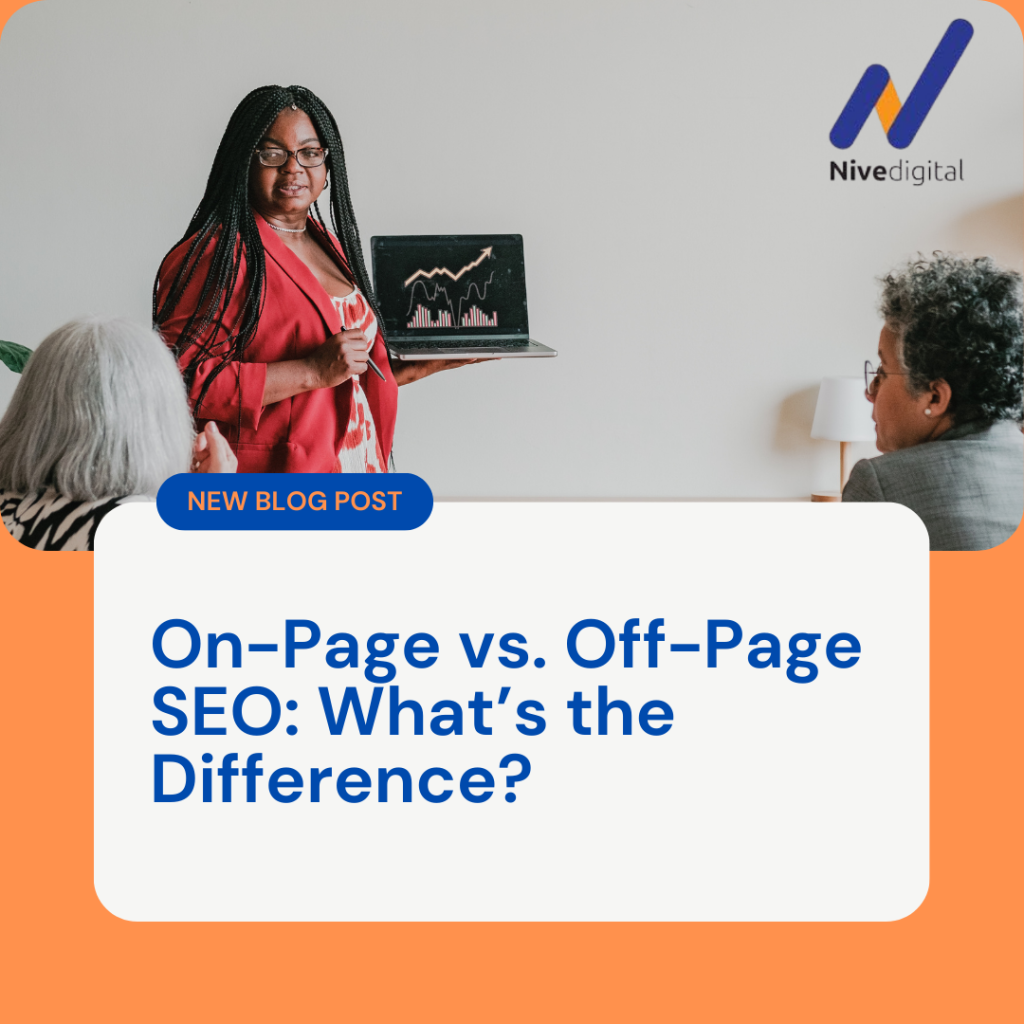
SEO (Search Engine Optimization) helps websites rank higher on Google and other search engines. To succeed, digital marketers must understand the difference between On-Page SEO and Off-Page SEO. Both play a vital role in improving website rankings, but they focus on different aspects of optimization.
In this guide, we will explain On-Page SEO vs. Off-Page SEO, their differences, and why both are essential for success.
What Is On-Page SEO?
On-Page SEO refers to optimizations done directly on your website to improve rankings and user experience. This includes content, HTML elements, and website structure.
Key On-Page SEO Factors
- Keyword Optimization – Use relevant keywords in titles, headings, and content.
- Meta Tags – Optimize meta titles and descriptions for better click-through rates.
- Header Tags (H1, H2, H3) – Structure content properly for readability.
- URL Structure – Use clean, keyword-rich URLs (e.g.,
example.com/on-page-seo). - Internal Linking – Link to relevant pages within your website to improve navigation.
- Mobile-Friendliness – Ensure your website is responsive on all devices.
- Page Speed – Optimize images and code for fast loading times.
- User Experience (UX) – Improve design, readability, and navigation.
- Schema Markup – Add structured data to help search engines understand your content.
Why Is On-Page SEO Important?
- Helps search engines understand your content better.
- Improves user experience, leading to higher engagement.
- Increases organic traffic by ranking for relevant keywords.
- Builds a strong foundation for overall SEO success.
What Is Off-Page SEO?
Off-Page SEO refers to actions taken outside your website to improve its ranking and authority. This includes backlinks, social signals, and brand mentions.
Key Off-Page SEO Factors
- Backlinks – Get links from reputable websites to boost authority.
- Social Media Signals – Shares, likes, and engagement on social platforms.
- Brand Mentions – References to your brand on other websites.
- Guest Blogging – Writing content for other websites with backlinks to your site.
- Local SEO – Optimize your Google My Business profile for local rankings.
- Influencer Marketing – Collaborate with influencers to gain exposure.
- Forum Participation – Engage in industry-related discussions on forums.
- Press Releases – Get featured in news sites for credibility.
Why Is Off-Page SEO Important?
- Improves domain authority (DA) and trust.
- Helps rank higher in competitive search results.
- Increases website credibility and brand reputation.
- Drives referral traffic from external sources.
On-Page vs. Off-Page SEO: Key Differences
| Factor | On-Page SEO | Off-Page SEO |
|---|---|---|
| Focus Area | Website content & structure | External factors & website reputation |
| Key Elements | Keywords, meta tags, URL structure, internal links | Backlinks, social media, brand mentions |
| Control | Fully controlled by website owner | Depends on external sources |
| Goal | Improve website quality & relevance | Build trust, authority & credibility |
| Example | Optimizing title tags & page speed | Getting backlinks from high-authority sites |
How On-Page and Off-Page SEO Work Together
Both On-Page and Off-Page SEO are essential for ranking higher on Google.
- On-Page SEO ensures that your website is optimized and user-friendly.
- Off-Page SEO helps build trust and authority, increasing rankings.
Example: If you create high-quality content (On-Page SEO) and get backlinks from authoritative sites (Off-Page SEO), your chances of ranking higher improve significantly.
Best Practices for On-Page and Off-Page SEO
On-Page SEO Best Practices
- Use relevant keywords naturally in content.
- Write compelling meta titles and descriptions.
- Optimize images with alt text.
- Improve website speed and mobile responsiveness.
- Use internal links to guide users and search engines.
- Publish high-quality, informative content.
Off-Page SEO Best Practices
- Get backlinks from authoritative sites.
- Engage with your audience on social media.
- List your business on Google My Business and directories.
- Write guest posts for high-authority blogs.
- Encourage brand mentions and press coverage.
- Participate in forums and Q&A sites.
Final Thoughts
On-Page SEO and Off-Page SEO work together to improve your website’s visibility, traffic, and authority. To rank higher in Google Nigeria, digital marketers should focus on both strategies.
- On-Page SEO makes your website search-engine friendly.
- Off-Page SEO increases your site’s reputation and authority.
If apply both strategies, your website will attract more traffic, rank higher, and build a strong online presence.
FAQs
1. Which is more important: On-Page or Off-Page SEO?
Both are important. On-Page SEO helps search engines understand your site, while Off-Page SEO builds credibility and authority. You need both for the best results.
2. How long does it take to see results from On-Page SEO?
On-Page SEO changes can show results within a few weeks to a few months, depending on competition and content quality.
3. Can a website rank without Off-Page SEO?
Yes, but ranking will be harder. Off-Page SEO (especially backlinks) helps boost rankings, especially for competitive keywords.
4. What is the best way to get backlinks?
The best way is to create valuable content that other websites want to link to. Guest blogging, influencer collaborations, and industry mentions also help.

Article by:
Oyejobi Adeola, founder of NiveDigital & NiveDigital Academy, is a top expert in SEO and digital marketing.
With over a decade of experience, he has helped businesses grow through advanced SEO strategies and trained hundreds of students to succeed online.
His insights have been featured in top industry publications.


